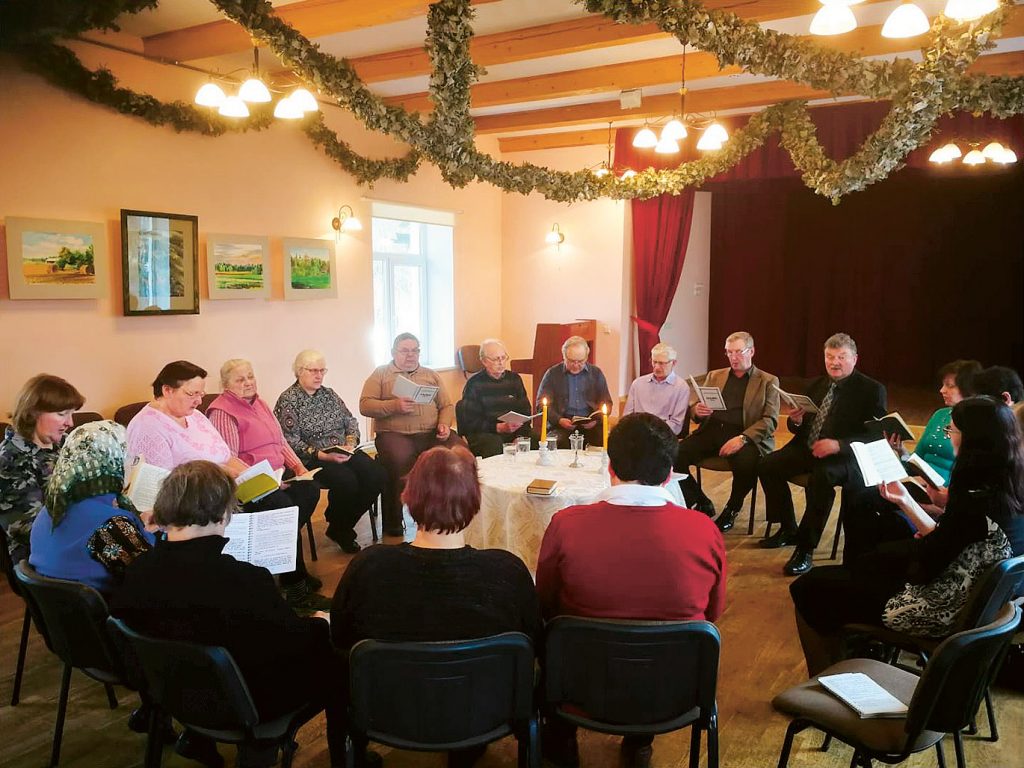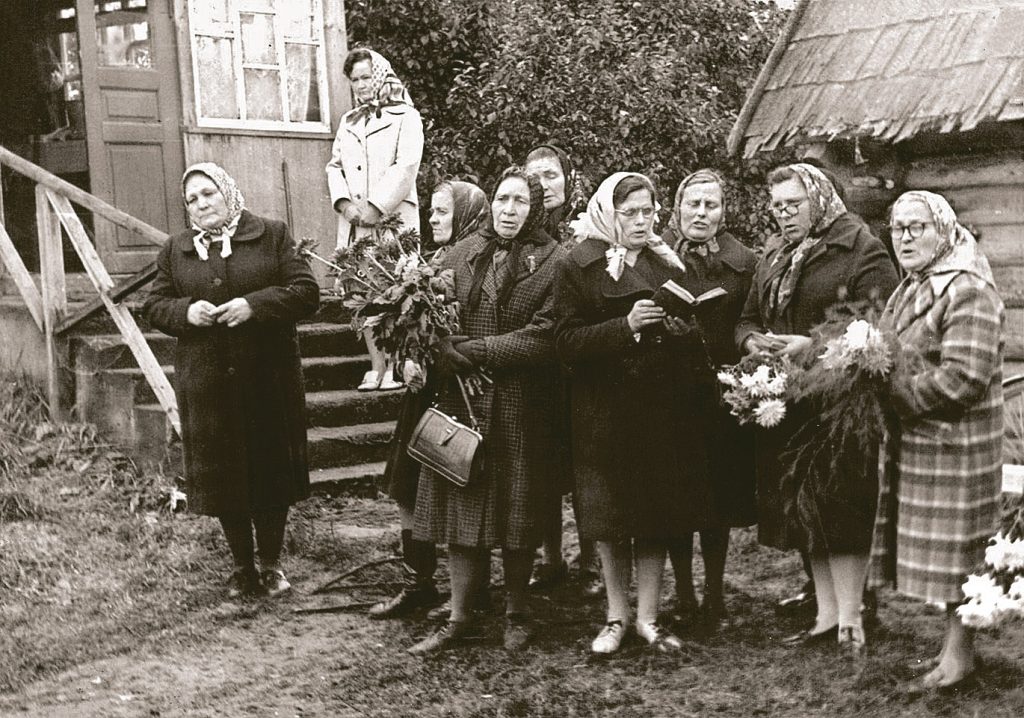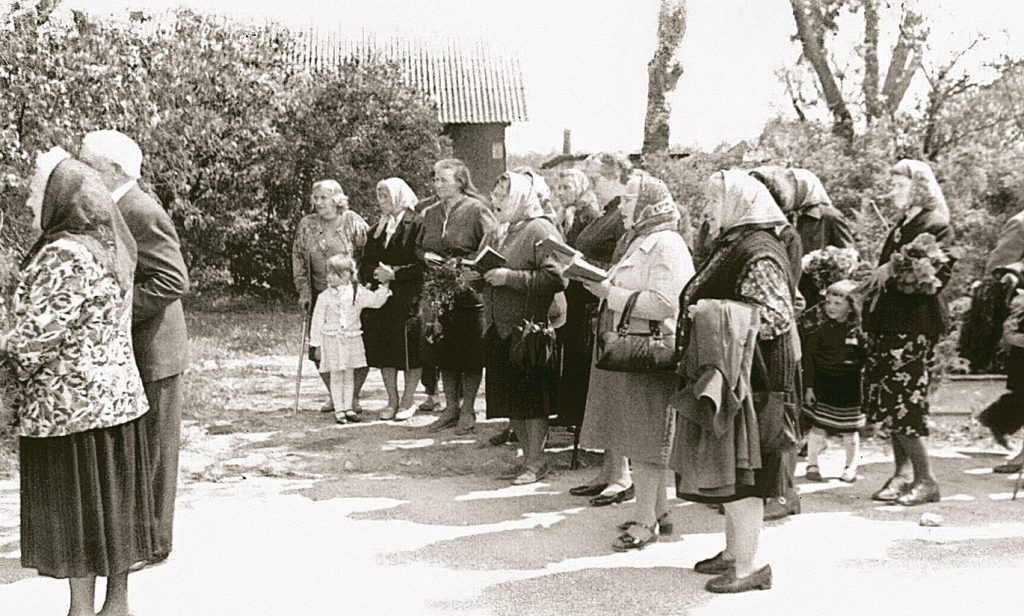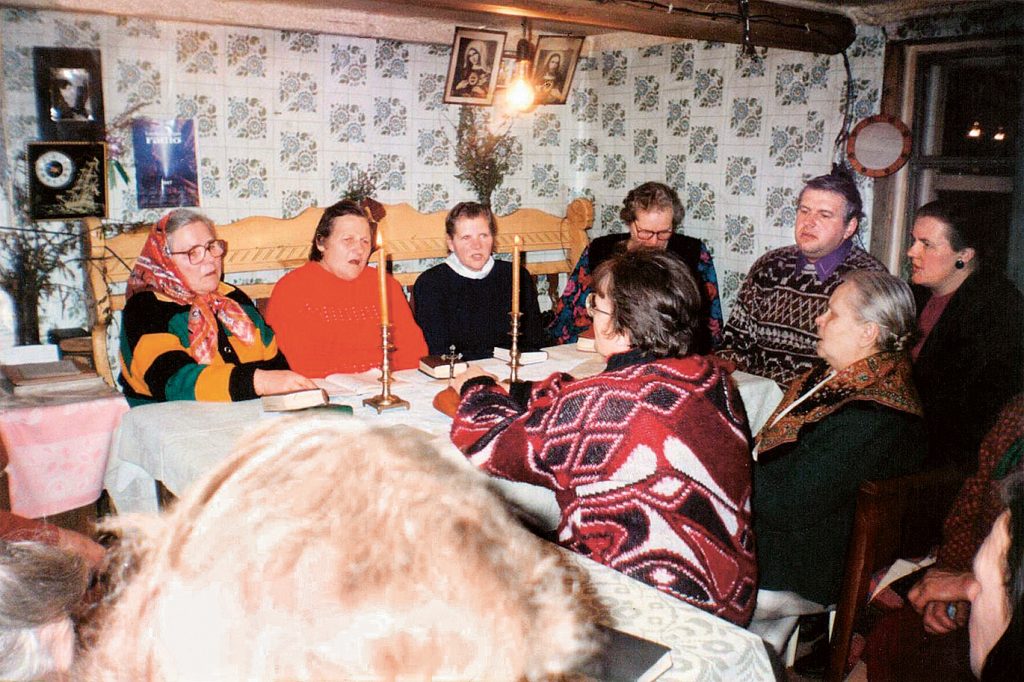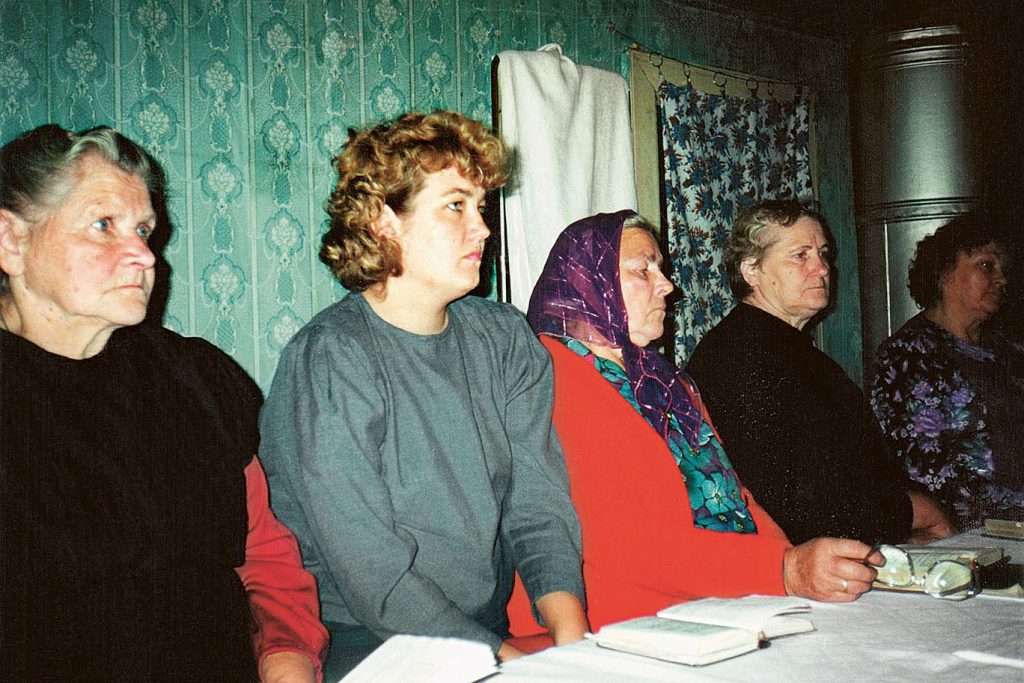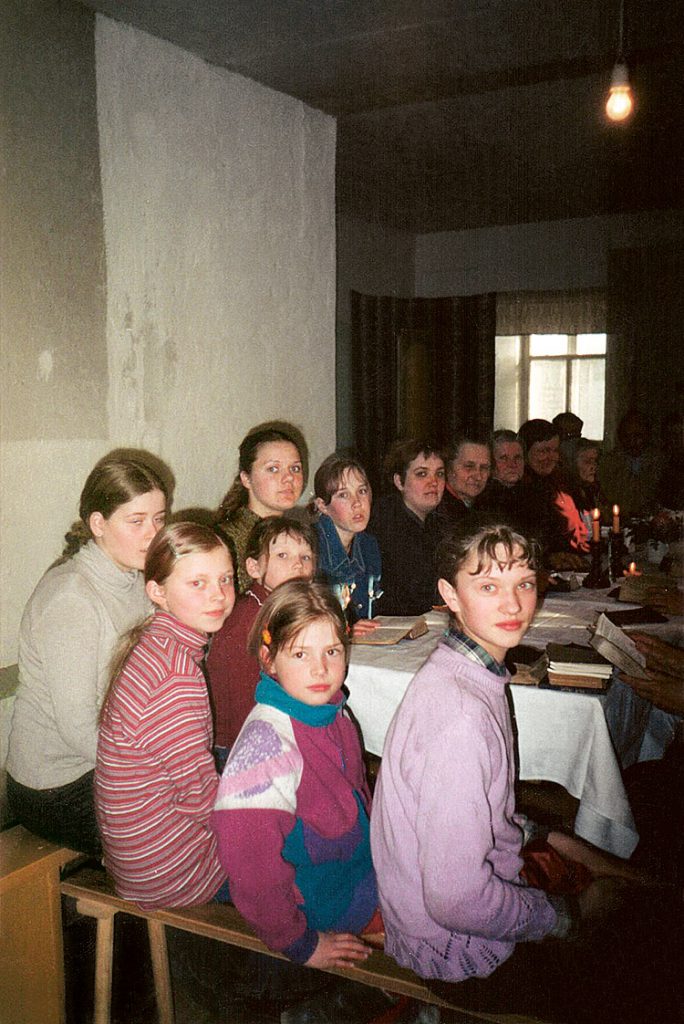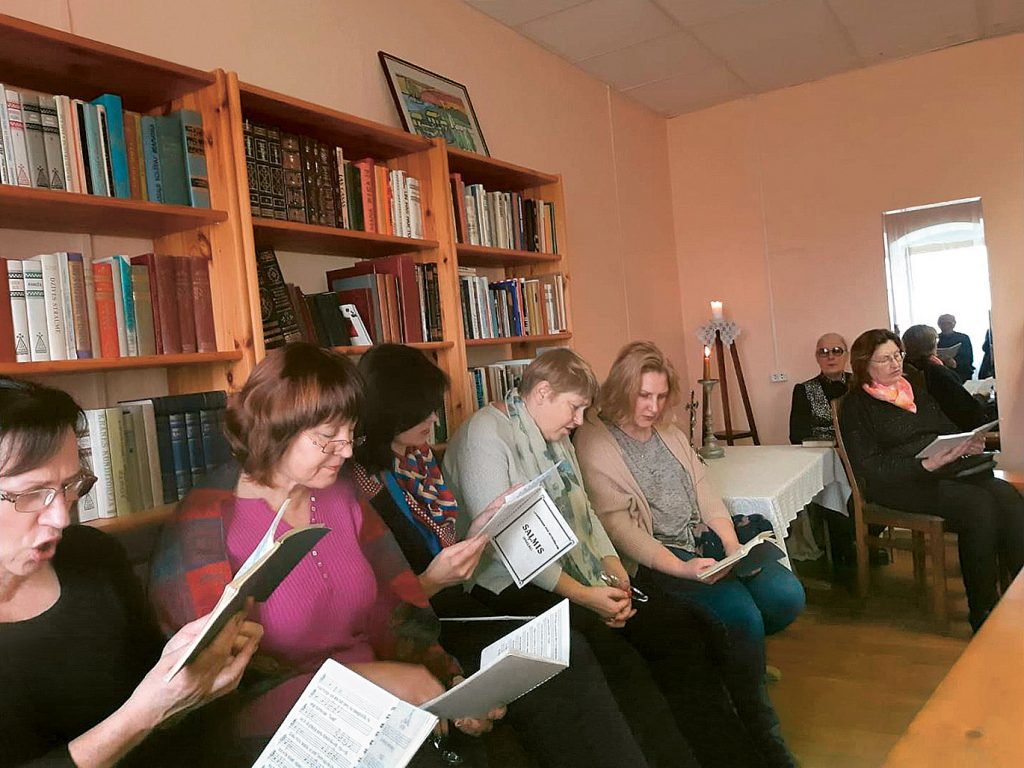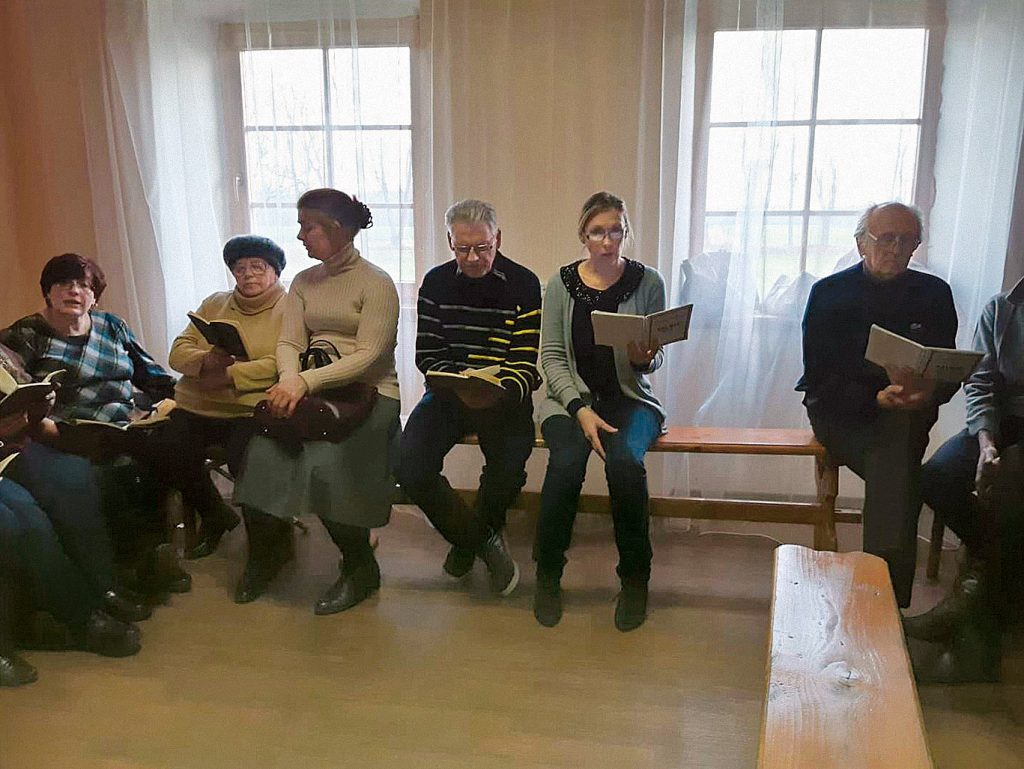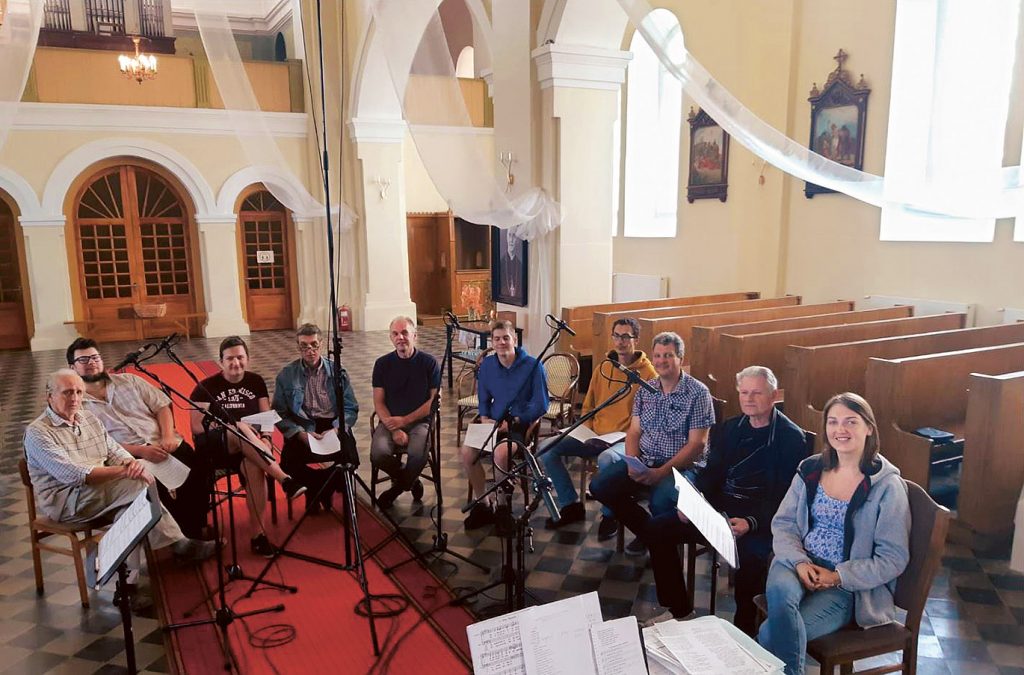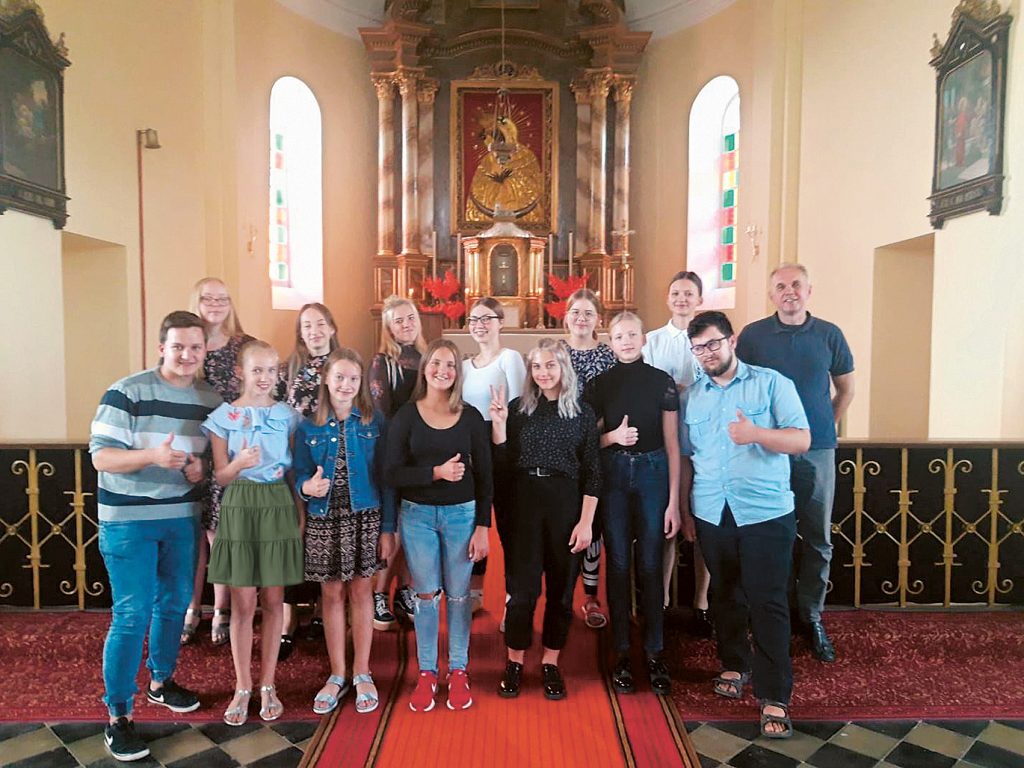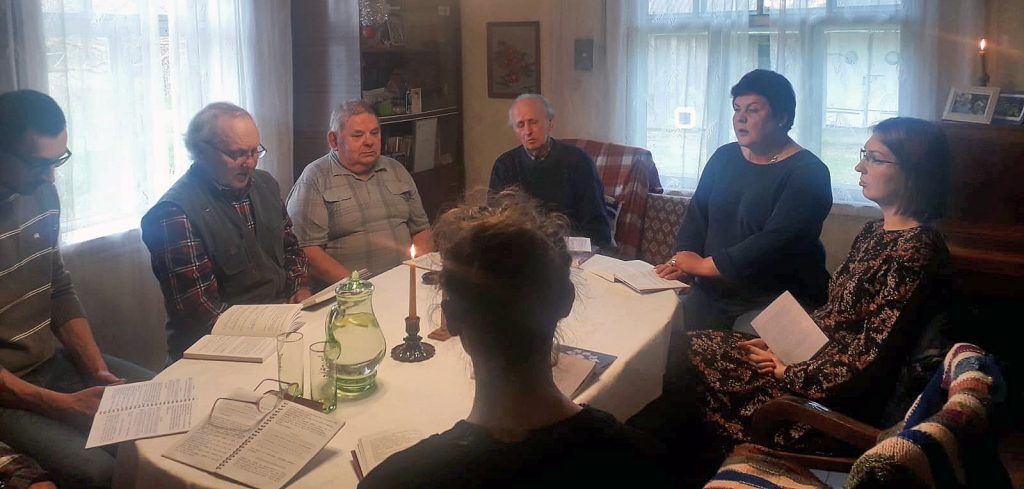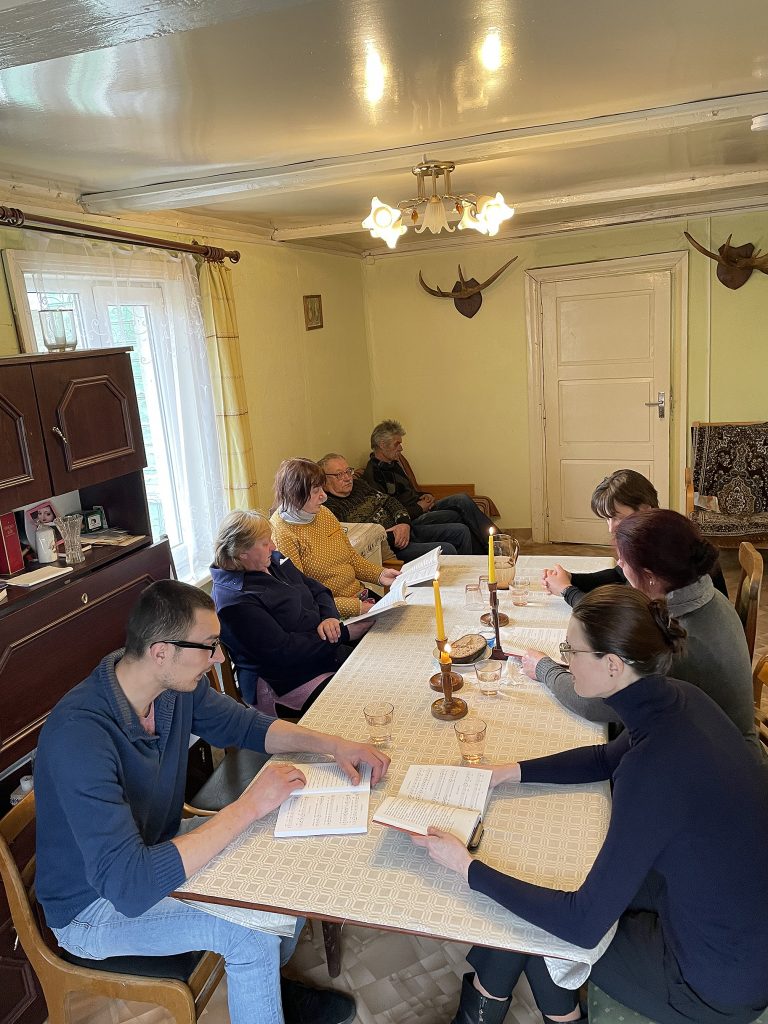Author:
Ieva Zepa
Social practices, rituals and festive events
Title
Saļmes in Stērnīne. Traditional psalm and funeral chants in Stirniene (2021)
Saļmes in Stērnīne
Saļmis. Saļmys. Saļmi. Saimis.
In Stirniene, traditional psalm chants for the dead or the Officium for the dead or exequies are called saļmes to fit with the sound of the local language better. It is the oldest known and locally practised sacred music tradition in Stirniene – the practice of praying for the souls of the dead during funerals or commemorative events by chanting psalms and relevant funeral chants. This tradition has rooted deeply into the local culture and the melodies have been adapted to the peculiarities of local traditional singing. In the Stirniene area, the psalm singing tradition is called saimes, salmes, saļmes, saļmis, saļmu dzīdōšona, pōtortolka, pōtoru skaiteišona.
Geography
Saļmes is a tradition of the Stirniene parish and the wider area around it.
In the Stirniene area, Catholicism is the dominant denomination; nearly every family has a connection to saļmes during their lifetimes, and there is rarely a funeral without the Office for the Dead. The tradition of chanting saļmes belongs as much to every Stirniene psalm singer and every person living in Stirniene, as it does to the whole Stirniene area and to the parish in whole, and any bystander who joins in during the ritual.
Importance in Community Life
The tradition of chanting saļmes is a common element that brings together the family in different generations. Already in the early 20th century, the Catholic mystic Theresa Neumann said that “The Latvian nation is able to survive only because it prays for their dead so much.”
By request of the family, saļmes are almost always sung when a Stirniene parish member has died. On All Souls’ Day and during Lent, the collective parish psalm chanting continues in the church and parish house, and, if possible, in the local old people’s house. The practice of annual psalm chanting in homes has decreased.
Saļmes are a healing practice in a way – they comfort one’s personal suffering when a close relative has passed, and offer a way to equalise the whole society as everyone prays for the forgotten souls, for people lost in wars, repressions, for both ones that did good and did harm, excluding none.
“He who honours the past blesses his future” – the people of Stirniene hold this old Roman saying true.
Activities
Psalm chanting is a prayer to save those souls who have gone to purgatory after their death, and these saved souls can then help the living from heaven. “The more you pray for the dead in your life, the better your life is,” said the lead psalm singer Jokstu Ģele. This quote has become a popular saying among the psalm singers (such a saying was also recorded in a field research interview by M. Boiko)
Saļmes are sung in the Latgalian language and exist as a orally inherited, folklorised phenomenon that is mainly performed at home and which gathers together family members, neighbours and relatives.
To prepare for chanting saļmes, a white tablecloth is laid out on the table, two blessed candles are lit, and a crucifix facing the exit door is placed between the candles. During funerals, salt and bread are placed next to the crucifix. The ideal number of singers is twelve. After chanting saļmes, everyone participates in a feast.A few days after the funeral, a conclusion of the process (called atbēres) is held. After chanting saļmes during this event, the new heads of the household are appointed, and the new lady of the house takes of her black headscarf and puts on a white one.
Beliefs, Rituals, Unwritten Rules
Saļmes are an integral part of the funeral ritual and prayers for the dead in Stirniene.
Even these, psalms are sung in Stirniene:
1) for funerals (before funerals and during ambers after the burial);
2) every November for the dead of the family or the household;
3) in church on All Saints’ Day (November 1st) after the church service;
4) in church during the All Souls’ Day (November 2nd) before the church service;
5) in the parish house once a week during the month of souls and during lent – for all those who have passed;
6) in the parish house once a week during the month of souls and during lent – for all those who have passed;
7) in an old peoples’ home – at least twice a year
8) at the request of relatives – on the anniversary of the birth or death of a relative;
9) in special cases when the departed has asked for direct or symbolic help in a dream: for example, bread, a clean shirt etc.;
10) in situations when unexplainable hardships fall on the household – illness of the livestock, illness of the people of the house, a dark streak in life;
11) in situations when there are unexplained happenings in the house which are interpreted as hauntings.
During saļmes chanting, a glass of water or some other beverage is usually placed on the table so the singers can quench their thirst. In one household, it was said that it is only acceptable to do at a drowned man’s funeral. Old singers used to say “If saļmes start playing in your head, look out – there is a funeral coming.” There is a belief that singers must watch on which side the candle burns out first – it is said that one of the people sitting on that side will be the first to die. If the candles burn bright, without wavering, crackling or smoking, the departed is doing well on the other side. If the house having the funeral has a small, still unbaptised child, the child must be baptised with haste so no evil spirits can attach to them.
After chanting saļmes there is a collective feast. There usually is also some usage of alcohol, but one of the singers explained her experience: “During the night I saw in a dream – the departed tells me: Why do you first put on your best Sunday clothes, but then pour nasty waste on them?” Therefore, it seems that consuming alcohol is not recommended while performing this ritual.
Inheritance and transmission
The singers of the older generation knew saļmes by heart, but nowadays, books or partial note scores are used. Saļmes are usually learned during collective singing – singers learn the melodies, peculiarities of the performance, rituals tied to the tradition.
In the Stirniene primary school, participants of the sacred music ensemble (2000–2015) gradually learned psalm chants as part of their extra-curricular education and participating in the Stirniene parish life. In the summer of 2020, 27 participants took part in psalm chanting classes – participants learned by collective singing, and did not study separate elements of the tradition.
Even up to 1990s, singers were still sometimes using the prayer book Pilneijga gromata lyugszonu uz guda Diwa Kunga iksszan tryjadibas winiga, wyssu swatokas Jumprovas Maryas un Diva Swatu… that was published in Vilnius in 1857. Singers were also singing from Aglyunas Zvaigzne (Vilnius, 1912), Goreigōs dzīsmes (Edited by P. Apšinīks, Rēzekne, 1936), SAĻMYS (arranged b A. Matvejāns, Viļāni, 2000), Krysta gaismā (Rēzekne, 2000, 2007) and from psalm notes in handwritten notebooks. Today, psalm chanting is done based on the brochure Saļmys (Stirniene, 2001) and Saļmes Stērnīnē (Stirniene–Rīga, 2020).
History
The Office for the dead as a type of hourly prayer comes from the mediaeval monastery tradition dating back to the 9th century, when exequies were performed during the vigil and on the funeral day. Over the centuries, the office for the dead was known as a prayer that is performed by priests in Latin.
In the second half of the 18th century, along with the work of Jesuit missionaries, exequies entered the traditional repertoire of Latgalian catholics – the texts of the psalms were translated into Latgalian and taught to the people. The first printed psalm texts appear in the Jesuit prayer book Nabożeństwo (1786) (compiled by Boiko, M. (2001, 348–377) Psalmu dziedāšanas tradīcija Latgalē. Acta Latgalica. vol. 11 Daugavpils: Latgolas pētnīceibas institūta izdevnīceiba).
The first church of the Stirniene parish in the 18th century is a Jesuit mission point. It is thought that the psalm chanting tradition might also have been brought to Stirniene already at the end of the 18th century, and saļmes are being sung in the Stirniene parish for more than 200 years. The oldest remaining people’s prayer book in the Stirniene parish is Pilneijga gromata lyugszonu uz guda Diwa Kunga iksszan tryjadibas winiga, wyssu swatokas Jumprovas Maryas un Diva Swatu… (Vilnius, 1857).
The most notable psalm lead singers:
– Mōra Madžuls (Mōreņa, 1870–1965) Teilāni community
– Agate Zalāns (Coce Agate, 1873(76?)–1965) Mesteri–Aizkalnīši
– Pēteris Zlēmets (Zlēmešu Pīters, 19th century end–middle of 20th century) Putriči community
– Helēna Pauniņa (Pauneņu Ģele, 1902–1995) Rūbežveipi
– Ludovika Leimane (Ļude Doņkas, 1905–1980) Rūbežveipi
– Donots Stafeckis (Stapecku Donots, 1910–2004) Stērnīne, Tyltagols
– Tekla Mestere (Mesteru Tekleite, 1920–1981) Aizkalnīši
– Paulīna Leimane (Jaudzimu Pauleite, 1921–2001) Rūbežveipi
– Tekla Kassaliete-Jaudzema (1921–2001) Kassalīši
– Helēna Jokste (Jokstu Ģele, 1922–2009) Teilāni
– Tekla Kasparāne (1924–2006) Grigi
– Eleonora Vēvere (1926–2006) Kassalīši
– Antoņina Vēvere (Vēveru Ante, 1927–2009) Stērnīne, Tyltagols
– Helēna Mestere (Majkovskīneite, 1927–2004) Stērnīne, Mesteri–Aizkalnīši
– Genovefa Priževoite (Priževoitu Ģence, 1929–2014) Stērnīne, Tyltagols
– Helēna Vaivode (Bazneicas Ģele, 1931–2019) Stērnīne, Tyltagols
– Leontija Pekstiņa (Peksteņu Ļone, 1933–2004) Brōki community
– Tekla Kassaliete (Kassalīšu Tekle, 1939–2014) Stērnīne, Tyltagols
– Anita Upeniece (Muižas Anita, 1975–2018) Stērnīne Manor
The passage of time has sped up, the older singers are becoming weaker, the melodies of less frequently sung chants have faded from memory, but the basic tradition is still being observed, even though the time spent on the performance has been shortened a bit. Yet the conductor Gruduļu Jōņs smiles and says: “The main thing is that it’s coming from the heart!”.
Nowadays, psalms are usually sung on the eve of the funeral, sometimes continuing into the night – “for the dead to have a lighter heaven” –Peksteņu Ļone. Up until the 1960s and 70s when there were still a bigger number of singers and people living in the area, leading up to the funeral, saļmes were sung every night from the day of death until the person was buried.
During the 19th century and early 20th century, the saļmes chanting skill was spread widely across multiple generations and singers of both genders (everyone in the household participated in the psalm chanting, the family could usually ensure its own psalm chanting needs). During the Soviet occupation, men became more detached from the tradition; children and the youth also became somewhat detached from the tradition due to anti-religion propaganda and fear of repressions. In the post-war years, psalm singers and leaders were mainly women.
Since the fall of the union, incredible change has taken place – men, children and the young are now also chanting saļmes. In the Stirniene primary school from 2000 to 2015, children were chanting in a sacred music ensemble, and along with the grown-ups participated in the annual psalm chanting as well as in some funerals. Many of them can still sing along saļmes, and some have learned the tradition well enough to lead the chanting themselves and teach others.
The saļmes in Stirniene and the corresponding funeral chants have been recorded and written down from the best saļmes leaders of the second half of the 20th century. The singers of the Stirniene sacred music choir Reversium (more than 30 people) and 14 children’s choir singers also maintain the tradition. In the summer of 2020, for two months on Sundays psalm singing master classes were taking place.
Masters
– Broņislava Vaška (known as Vašku Broņa, 1925) Stērnīne-Varakļōni – folk story teller.
– Antoņina Teilāne (known as Teilānu Ante, 1931) Teilāni – folk story teller, outstanding artisan.
– Veronika Ozoliņa sen. (known as Ūzuleņu Vera, 1933) Stērnīne – folk story teller, outstanding artisan.
– Anna Kanča (known as Sporānu Anna, 1935), Jaungaiļi – folk story teller.
– Genovefa Putriča (known as Putriču Geņa, 1936) Putriči community – folk story teller, multi-generational saļmes leader.
– Jānis Stafeckis (known as Stapecku Jōņs, 1938) Stērnīne – folk story teller, multi-generational saļmes leader.
– Jānis Erdmanis (known as Erdmaņu Jōņs, 1946) Stērnīne Manor – folk singer.
– Jānis Gruduls (known as Gruduļu Jōņs, 1946) Teilāni – outstanding choir conductor, teacher, conductor of the Stirniene sacred music choir Reversium, saļmes singer and leader.
– Ieva Zepa (known as Bazneicas Īva, 1976) Sternīne – Stirniene parish organist, teacher and cultural worker, singer of saļmes since childhood and leader.
– Jānis Zeps (known as Zepu Jōņs, 1991) Stērnīne – folk singer, singer of saļmes since childhood and leader of multiple generations.
– Ilze Grēvele-Skaraine (known as Grēveļu Ilze, 1992) Indāni – proffessional musician and music teacher, outstanding early music interpreter, saļmes singer since childhood and leader.
– Gunta Greisle (known as Greišļu Gunta, 1999) Mesteri-Aizkalnīši – professional musician, vocalist, student of the Jāzeps Vītols Latvian Academy of Music, singer of saļmes since childhood, saļmes leader.
Institutions and Organizations
The Stirniene St. Laurentius Roman Catholic Parish and the Friends of Stirniene Society
Strengthening the Tradition
The psalm and funeral chants were collected, organised and written down via the locals’ own volunteer work from 1992 to 2017 (Ieva Zepa, consultant Jānis Gruduls) from the old singers and psalm leaders of the Stirniene parish: Helēna Grēvele (locally known as Jokstu Ģele), Antoņina Vēvere (Vēveru Ante), Genovefa Priževoite (Ģence), Helēna Vaivode (Bazneicas Ģele), Helēna Mestere (Majkovskīne), Veronika Ozoliņa (Ūzuleņu Vera), Tekla Kassaliete (Kassalīšu Tekle).
In the Stirniene Primary School, participants of the sacred music ensemble were learning psalm chanting (2000–2015).
Copied brochures Saļmys with saļmes texts and the melodies characteristic of the Stirniene parish were published (2001).
The notation of psalm and funeral chants has been digitised (Bernadeta Everse, 2019).
A collection of sheet music called Saļmes Stērnīnē was published in 2020, containing the traditional psalms characteristic to Latgale, along with a description of the tradition, explanations of old words, a list of singers, photographies and a double CD with audio recordings. The collection of sheet music has been formatted to have bigger letters to improve accessibility for elderly people and people with special needs. The project was financially supported by the State Culture Capital Foundation of Latvia with a co-financing of 3500 EUR.
In the summer of 2020, psalm chanting master classes were held (27 students).
The tradition of chanting psalms during funerals and in the Stirniene church continues.
In 2021 with a co-financing of 1800 EUR from the SCCF, a video recording was made, photos were collected and an application for the Intangible Cultural Heritage list.
By conducting projects connected to saļmes chanting, as well as continuing the tradition in everyday life, psalm chanting has been popularised in society, mass media and on the internet. Psalm collections and CDs have reached many families in the Stirniene area and in the Latgale region, as well as outside of the Latgale region and even outside of Latvia; people sing along with these materials and pray, feel a connection to their nation, their country, their roots. Something that is characteristic and unique in Stirniene has been preserved. Each sacred music fact, both ancient and new, is important to Stirniene to ensure preservation, development and new creation. They contribute to people’s sense of togetherness and individual expression. The cultural landscape of Stirniene is not conceivable without the ancient and contemporary sacred music traditions, their development and interactions. "According to the description (and it can be seen and heard in the accompanying modern video and audio recordings), for some years, the reference system has been based on recorded and thus, in one particular way, strengthened melodies, which are used in teaching events and different performances. This means the end of the oral tradition of the Office of the dead. Now, it’s entered a written plane. The inheritance and learning is now mediated by published transcriptions. (..) The recordings now show a noted phrasing, a well thought-out use of caesuras, a uniformity of performance. Simultaneous variations, spontaneous asynchrony and approximations of intonation are excluded. The tonal approach and articulation now resembles that of amateur collectives and choirs. A practice of local Catholic repertoire revival is happening right in front of our eyes (and ears). A fundamentally new phenomenon is being created. In the specific example it, of course, has a variety of ties to the old, authentic form. A small number of representatives of the old form are still amongst the participants. But in reality, the music performance now has a different basis and is using a multitude of new approaches. It must be added, that the aforementioned developments are a natural process of the modern day, and should not be judged as positive or negative. They just exist, develop and continue. And their results do have and will continue to have their place in the modern music landscape that has been shaken deeply by diverse and rapid changes.” (2021, conclusions of the expert prof. M. Boiko). An old man in the Stirniene area is said to have said “I may be insignificant, but I think of the Higher!” Therefore, the people of Stirniene continue working and looking towards the future with impenetrable optimism.
Financial support by the SCCF, the Stirniene St. Laurentius Roman Catholic parish and private citizens. Recommendation by the Roman Curia of the Ecclesiastical province of Riga.
Continuity/Development
A chapter in the the doctoral thesis of Ieva Zepa has been dedicated to the saļmes in Stirniene – FOLKLORA UN KRISTIETĪBA. 20.–21. GADSIMTA STIRNIENES DRAUDZES /PAGASTA PIEMĒRS (Folclore and Christianity. Example of the 20–21st century Stirniene parish/pagasts). As part of the thesis work, field research, interviews, writing down of memories and biographies, diaries, audiovisual material research will be conducted. The thesis is aimed to be finished by 2024.
There are plans to continue singing both at home and in the parish, address the society, create new interest and encourage restarting the tradition and joining in, as well as attract the younger generation and have teaching events. The tradition is continued both by the existing singers and leaders, and the newcomers - the students from the Jānis Ivanovs Rēzekne Music Secondary School and and students from the Jāzeps Vītols Latvian Academy of Music that participate in the Stirniene choir; the children and youth annual studio Stērnīnes Dzīdūšōs dīnas (The Singing Days of Stirniene) (since 2001). The safekeeper and advancer of the tradition will be the Stirniene St. Laurentius Roman Catholic Church; the popularisation and publicity events will be organised by the Friends of Stirniene Society.
The aim of the book Saļmes Stērnīnē is to safeguard and continue the psalm chanting tradition in Stirniene and its surrounding area, maintain its sustainability, publish educational and conservational materials, pass down and popularise knowledge and skills of intangible cultural heritage and include it in life-long education.
The master classes provide an opportunity to learn psalm chanting under the leadership of masters.
The main goals of all actions taken thus far is to maintain the tradition in the long term, create a community, and strengthen the Latgalian catholic identity.
Threats to the Tradition
The main threat to saļmes is globalisation and overall secularisation of society. The continuity of tradition breaks in any place when it is no longer valued and seen as a necessity of life, when a sense of belonging to the heritage is lost, when there are no more psalm leaders and a wish to sing. In the Stirniene area, the tradition is threatened by a dramatic decrease in population and by the changing of novads (administrative and historic area) borders, because, if there is no sense of belonging to the Latgale cultural space, the Latgalian identity and cultural heritage values are not being safeguarded.
Applicant
Stirnienes draugu biedrība (Friends of Stirniene Society), Reg. No. 40008296789
Photo Gallery
Audio Materials
Video Materials
Text Materials
Publications
Boiko, M. (2005, 13-20 May, No. 18 (148): 4) Jesuit: mentality and heritage.// cultural forum
Boiko, M. (2019, 84-93) Jesuit field mission books and traditional music of Latgalians. Some notes, assumptions, and findings. National Library of Latvia, scientific articles 4/XXIV. Riga: National Library of Latvia
Boiko, M. (2005, No. 20 (160), 4) The historic and stylistic layers of the traditional music of Latgale. Catolic traditional music. Cultural Forum
Boiko, M. (2005, 79-98) deceased optimism: the dynamics of tradition in the 20 th century// Letonica. Journal of Humanitarian Sciences: literature, folklore, art, No. 13. Riga: LU literature, folklore and art institute
Boiko, M. (2004, No. 5 (25): 24-27) Death, autumn, dreams and dead offensive in Latgale.// Music sun
Boiko, M. (2001, 348 –377) psalm singing tradition in Latgale. Acta Latgalica. Zinectnical roksts, documents, trimmings. No. 11. Daugavpils: izdevnīceiba of Latgola Research Institute
Boiko, M. (2002, 115-125) meeting with dead dreams: typical and untyped narrative and their functional and cultural historical context. From: Louse, A. (red. 2002) Man. Life. Narration. Riga: Latvian anthropologist association, Latvian university literature, folklore and art institute
Brence, I. (1995) Catholic Church music in Latgale. Bachelor's work JVLMA. Riga
Big beard, A., Boiko, M. (2012) psalm singing in Latgale. Officium defunctorum. The Office ofthe Dead in Latgale. Riga: LU literature, folklore and art institute
Mester, L. (30.10.2020) The Society of Friends of Stirnies issued two valuable expenditures. A local newspaper.
Synthesis of urka, B. (2012) Catholic and Paganic traditions in Latgale music. Bachelor's work JVLMA. Riga
Zepa, I. (2020). Crumbs in Sturneen. Traditional psalm singing Krajums and double disc. Riga: Dark Holography
Beitane, A. (2014) Traditional Polyphony in the officium defunctorum in North-Eastern Latvia. Rusudan Tsurtsumia and Joseph Jordania (Eds). Treatment of the 6 th International Symposium on Traditional Polyphony. Tbilisi: International Research Center for Traditional Polyphony of Tbilisi Vano Sarajishvili State Conservatoire
Beitane, A. (2009). The vocal voices of late origin in Latvian traditional music (Multipart Singing of Recent Origin in Latvian Traditional Music). Riga: LULFMI.
Slišan, O. (2010). Fermentation of chiacrxinate or felled roots. Z/SJākupāni, GIRG
Websites
https://klasika.lsm.lv/lv/raksts/etno-vestis/ieva-zepa-pec-psalmu-dziedasanas-majas-iestajas-fizisks-miers.a141909/ - Interview (in Latvian) with Ieva Zepa about the saļmes chanting tradition in Stirniene - interview with Ieva Zepu on the singing tradition in Stirniene.
https://lr1.lsm.lv/lv/raksts/kolnasata/izguojs-dubultdiskys-salmes-sternine.a136511/ - Interview (in Latvian) with Ieva Zepa about the saļmes chanting tradition in Stirniene - interview with Ieva Zepu on the singing tradition in Stirniene.
https://hearthis.at/rml/rita-celiens-rml-s06e039b/ - Interview (in Latvian) with Ieva Zepa about the saļmes chanting tradition in Stirniene - interview with Ieva Zepu on the singing tradition in Stirniene.

